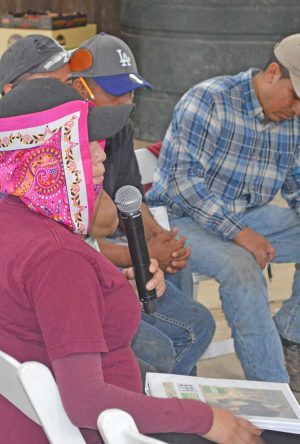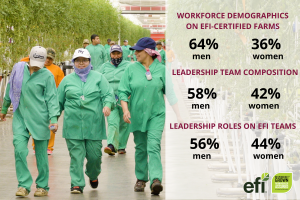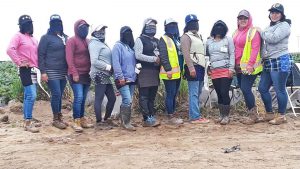 Eighty percent of female farmworkers report experiences of sexual harassment at work. That’s more than double the reported statistics for women working across all industries.
Eighty percent of female farmworkers report experiences of sexual harassment at work. That’s more than double the reported statistics for women working across all industries.
According to the Institute for Women’s Policy Research, contributors to increased risk include working in male-dominated and isolated environments, lacking legal immigration status or working on a temporary visa and having an imbalance of power between employees and management. Lacking trustworthy advocates can also keep women from speaking up about their experiences.
The number of women working in agriculture is increasing, and while the problem of sexual harassment is pervasive, concerned industry leaders can make a difference for women by taking steps to cultivate change and prevent harassment in their organizations.
Data from a three-year study by BDS Consulting shows that the Equitable Food Initiative (EFI) Program protects against sexual harassment and creates equality for female and minority workers on certified farms.
EFI workforce development programs create positive, harassment-free environments for women by balancing power, creating pathways for women to speak out and ensuring training and respect for all through adherence to the EFI Standards.
Workforce Development Programs Balance Power
 Sexual harassment feeds on power imbalance. Correcting that imbalance is central to EFI’s success in building respect-filled environments.
Sexual harassment feeds on power imbalance. Correcting that imbalance is central to EFI’s success in building respect-filled environments.
According to Forbes, simple people skills like listening with care, having empathy and considering the ideas or insight of others can help balance power at work.
The EFI Program develops these soft skills, teaching empathy, communication and active listening during a 40-hour training created specifically for agricultural workers and adapted for the needs of each farming operation pursuing certification.
One EFI Leadership Team member described his experience this way: “EFI trainings are very dynamic, very practical. We learn to let go of our fear. We work on topics like stress, dignity and respect. I evolved as a manager—I used to be colder, more direct. [The training] encourages more sensitivity, empathy, listening to others and putting yourself in their shoes.”
Management styles and relationships between co-workers are transformed through the EFI Leadership Team training, and many employees report taking these skills home to improve relationships with their spouses and children.
Leadership Teams Make Space for Women’s Voices

EFI Leadership Teams are the key to the EFI model’s success. Leadership Teams work collaboratively year-round to ensure the EFI Standards are maintained and to identify and resolve issues on the farm. According to one EFI grower, an increase in reported problems after the Leadership Team is activated is a good thing—it means the program is working and people are speaking up.
Women have always been well-represented on EFI Leadership Teams. While women make up 36% of the total workforce on EFI-certified farms, they make up 42% of Leadership Team membership.
With numbers like that, female employees can easily bring their grievances or ideas to a woman in leadership, enabling women’s voices to be heard and problems important to women to be addressed using the EFI problem-solving cycle.
Here are a few of the women-centered solutions generated by EFI Leadership Teams:
- Making lactation tents available in the fields for nursing moms at Andrew & Williamson Fresh Produce/GoodFarms.
- Accommodating pregnant women with less physically demanding job assignments at Andrew & Williamson/GoodFarms.
- Installing lighting in the parking lot for increased safety when coming and going to work in the dark at Houweling’s Tomatoes.
Harassment-Free Assurance Through EFI Standards
 Of more than 300 EFI Standards, the Social Standards in particular give clear guidance to growers and Leadership Team members. Sexual harassment is expressly prohibited.
Of more than 300 EFI Standards, the Social Standards in particular give clear guidance to growers and Leadership Team members. Sexual harassment is expressly prohibited.
As detailed in the EFI Standards, all hired employees must receive sexual harassment training. Penalties for committing acts of harassment must be clearly stated, and representatives must be appointed to liaise with management and ensure issues of harassment are addressed.
This year, a sexual harassment prevention resource toolkit that EFI helped to fund, was produced for the agricultural industry. Created by the Pacific Northwest Agricultural Safety and Health Center, the toolkit includes a training film, facilitator guides, audio resources, posters and supporting materials like wallet cards and a PowerPoint presentation. All of these resources are now available to EFI-certified growers on the EFI website.
Certified growers have seen that providing a respectful, harassment-free work environment by holding to the EFI Standards strengthens an organization’s ability to draw in and keep workers.
According to Jackie Vazquez, Director of Operations for Andrew and Williamson/GoodFarms’ Watsonville District, “We have zero tolerance for sexual harassment. Because of these changes, workers are referring their spouses and female family members, and we now have a higher percentage of women working with us.”
Learn more about the EFI Standards and the benefits of customizable workforce development programs at equitablefood.org.
Related articles:
VIDEO: ¡Basta! Prevent Sexual Harassment in Agriculture: Interview with Mike Gempler

